
| RYCEF | 1.94% | 17 | $ | |
| SCS | 0.12% | 16.14 | $ | |
| BCC | 2.57% | 83.91 | $ | |
| GSK | 0.97% | 52.985 | $ | |
| CMSC | -0.38% | 23.66 | $ | |
| RIO | 2.68% | 95.07 | $ | |
| RBGPF | 0.12% | 82.5 | $ | |
| CMSD | -0.71% | 23.91 | $ | |
| RELX | -18.32% | 30.03 | $ | |
| VOD | 1.71% | 15.17 | $ | |
| NGG | 1.64% | 86.02 | $ | |
| BCE | 1.39% | 26.195 | $ | |
| JRI | -0.19% | 13.125 | $ | |
| AZN | -1.3% | 185.995 | $ | |
| BTI | 1.49% | 61.91 | $ | |
| BP | 1.22% | 38.165 | $ |
US pharma giant Merck ditches plan for $1.4-bn research centre in UK

Merck, the US pharmaceutical group, said on Wednesday it has dropped plans to build a $1.4-billion research centre in Britain, blaming the country's "lack of investment" in the sector and its drugs prices.
The company said in a statement it would not go through with the construction, which had been slated for the King's Cross district in central north London.
The British government acknowledged the "concerning news" and was standing by to help Merck employees in the UK and others affected by the development, a spokesman told AFP.
Merck said it would no longer take possession of Belgrove House in King's Cross, ditching a project that was to have engaged 800 workers over the next two years.
It said the decision stemmed from a company evaluation of its research capabilities "and reflects the challenges of the UK not making meaningful progress towards addressing the lack of investment in the life science industry and the overall undervaluation of innovative medicines and vaccines by successive UK governments".
It said it would also close down its activities in two London labs by the end of the year, leading to 125 job losses.
The Merck statement confirmed news first reported by The Financial Times. The daily quoted the company as saying: "Simply put, the UK is not internationally competitive."
The British government spokesman told AFP that "the UK has become the most attractive place to invest in the world, but we know there is more work to do."
He said the government recognised that the decision would dismay Merck employees in the country, and it "stands ready to support those affected".
Merck's decision follows that of UK sectoral rival AstraZeneca to abandon plans to build a $540-million vaccine factory in Britain, in the Liverpool region, because of what it said were insufficient state incentives.
The world's biggest pharmaceutical groups have this year come under pressure from US President Donald Trump to invest in America or see their production in other countries be hit with swingeing tariffs.
M.Johnston--SMC


 London
London

 Manchester
Manchester
 Glasgow
Glasgow
 Dublin
Dublin
 Belfast
Belfast
 Washington
Washington
 Denver
Denver
 Atlanta
Atlanta
 Dallas
Dallas
 Houston Texas
Houston Texas
 New Orleans
New Orleans
 El Paso
El Paso
 Phoenix
Phoenix
 Los Angeles
Los Angeles


